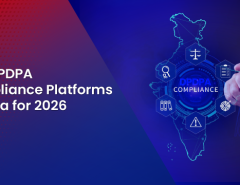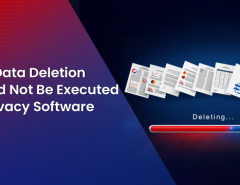Introduction
In today’s digital-first economy, data has become the backbone of every business operation—from customer onboarding and marketing to employee management and vendor coordination. Every digital interaction generates data. But with this opportunity comes responsibility: how that data is collected, processed, and protected.
For business leaders, especially in India, data privacy has moved from a compliance checkbox to a core business priority. The Digital Personal Data Protection (DPDP) Act, 2023, has made it mandatory for organisations to handle personal data responsibly—or face severe financial and reputational consequences.
Consumers are also paying attention. Studies reveal that over 80% of Indian customers choose brands based on how well their personal data is protected. In other words, compliance builds trust, and trust builds business.
Let’s explore data privacy fundamentals and why every leader needs to make it part of their business DNA.
What is Data Privacy?
Data privacy refers to the responsible collection, storage, and use of personal information in a way that respects an individual’s rights and choices. Personal data includes any information that can identify a person—such as name, phone number, Aadhaar or PAN, email address, health records, location, or behavioural insights like purchase patterns.
Data privacy is about transparency and control—ensuring individuals know how their data is used and allowing them to manage or withdraw consent.
When mishandled, data can become a liability. In 2024, the average cost of a data breach in India touched ₹19.5 crore, with phishing and stolen credentials emerging as leading causes. Beyond financial losses, such incidents can permanently erode customer confidence.
Why is Data Privacy Important?
- Protecting individual rights
Every person has the right to safeguard their personal information. Data exposure can lead to fraud, identity theft, and reputational harm. Ensuring privacy protection upholds ethical business standards and strengthens consumer confidence.
- Building customer trust
Trust is the new currency in digital business. Customers prefer companies that demonstrate accountability and transparency in data handling.
In India, 82% of customers associate strong data protection with brand trust, even though 76% remain concerned about privacy on social platforms. This disconnect represents an opportunity for organisations to differentiate themselves by prioritising privacy as part of their value proposition.
- Ensuring regulatory compliance
The DPDP Act, 2023 has set a new benchmark for data governance in India. Non-compliance can lead to penalties of up to ₹250 crore. Adhering to privacy principles reduces legal risk and strengthens your organisation’s reputation as a responsible data custodian.
Understanding the DPDP Act
The Digital Personal Data Protection (DPDP) Act, 2023 establishes clear rules for how organisations collect, store, and process personal data in India. It applies to any entity offering goods or services to individuals in India, even if the processing occurs outside the country.
Key provisions for business leaders include:
- Informed Consent: Data must be collected only after obtaining precise, specific, and informed consent from the individual, with the option to withdraw it easily.
- Transparent Notices: Businesses must provide concise, accessible privacy notices explaining what data is being collected, for what purpose, and how users can exercise their rights.
- Data Principal Rights: Individuals can access, correct, delete, and raise grievances related to their data.
- Accountability Measures: Organisations must implement technical and organisational safeguards and report data breaches to the Data Protection Board of India (DPBI) and affected individuals when required.
Key Terms to Know:
- Data Principal: The individual whose data is collected (customer, employee, etc.)
- Data Fiduciary: The organisation that determines how personal data is processed
- Consent: Freely given, informed permission from the Data Principal
- Data Principal Rights: Rights to know, correct, erase, and raise complaints about data handling
Why Business Leaders Should Care
Every business—large or small—handles personal data. Whether it’s customer information, employee records, or vendor details, the onus of protecting that data lies with leadership.
Failure to comply with privacy requirements can lead to:
- Regulatory penalties and legal action
- Loss of customer trust and brand credibility
- Operational disruptions and financial impact from breaches
Data privacy is not just an IT or legal issue—it’s a strategic leadership priority.
Common Data Privacy Pitfalls
Many Indian organisations are still evolving in terms of their privacy maturity. Common errors include:
- Collecting unnecessary personal data
- Failing to obtain valid, informed consent
- Storing data without encryption or access controls
- Sharing information with third parties without authorisation
- Neglecting employee data protection
Even small oversights can have large consequences. Proactively addressing these helps businesses avoid compliance risks and build stronger governance frameworks.
How Businesses Can Strengthen Data Privacy
Here’s a practical roadmap to embed privacy into your business operations:
- Map your data ecosystem
Identify what personal data your organisation collects, where it’s stored, and who accesses it. - Simplify consent management
Ensure consent forms are precise, user-friendly, and compliant with DPDP requirements. - Secure your data
Apply encryption, multi-factor authentication, and strict access controls to protect sensitive data. - Enforce access governance
Limit data access to authorised personnel based on defined roles and responsibilities. - Educate your workforce
Conduct regular privacy and cybersecurity training to create a culture of accountability. - Establish a transparent privacy policy
Clearly communicate how data is collected, processed, and protected—and how users can exercise their rights.
Conclusion
In the digital economy, trust is a strategic differentiator. Data privacy is no longer just a compliance requirement—it’s an enabler of business resilience and customer loyalty.
By embedding privacy into your business processes, you demonstrate respect for your stakeholders and align with global standards of responsible governance.
If you’re beginning your data privacy journey, Seqrite Data Privacy offers a comprehensive, enterprise-grade platform designed for Indian businesses. It enables you to:
- Discover and classify personal data across your organisation
- Manage Data Principal Rights requests with ease
- Automate compliance with DPDP, GDPR, HIPAA, and other global frameworks
- Gain transparency with dashboards and role-based access controls
With Seqrite Data Privacy, you build compliance into the core of your operations—strengthening trust, reducing risk, and positioning your business for long-term success.




